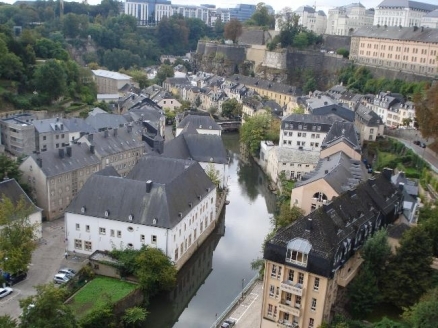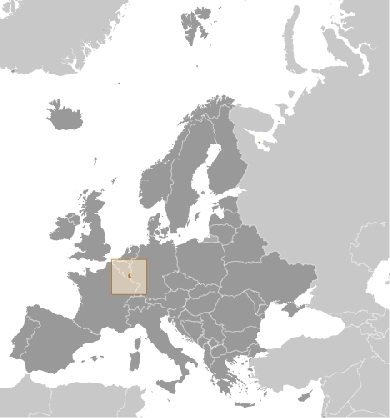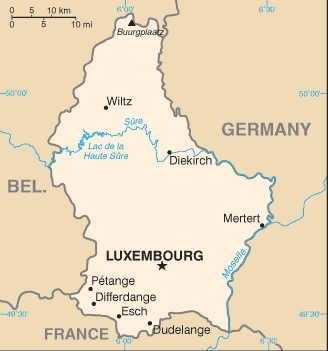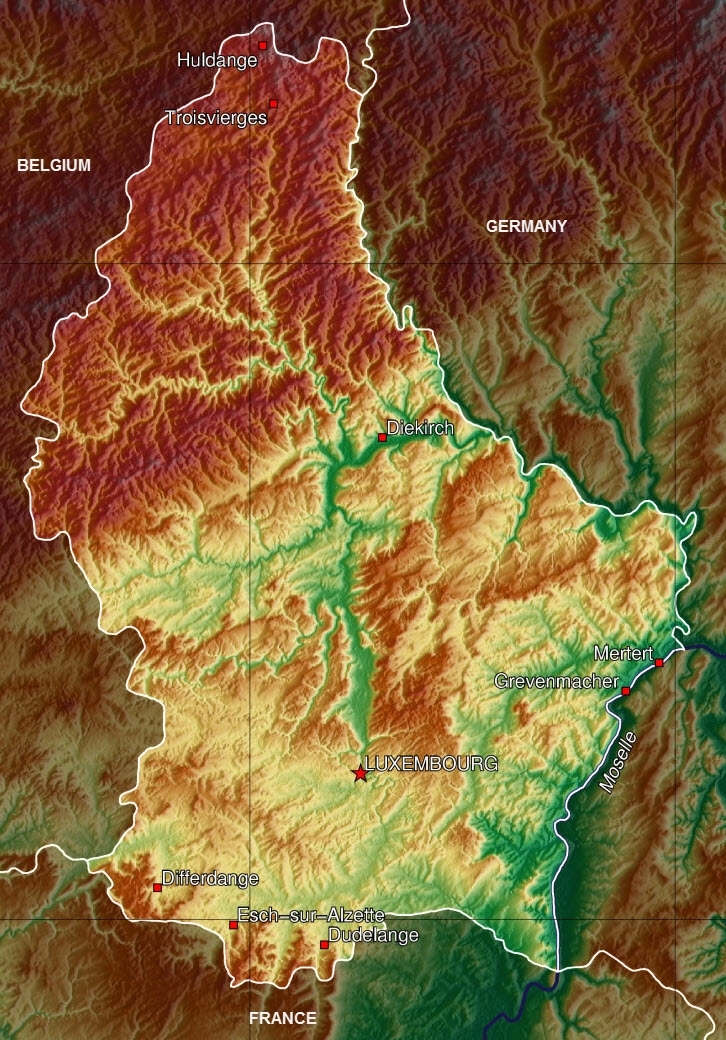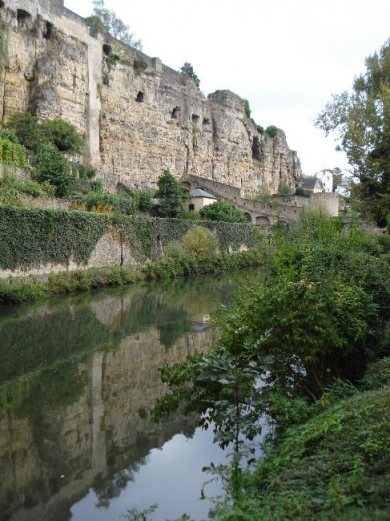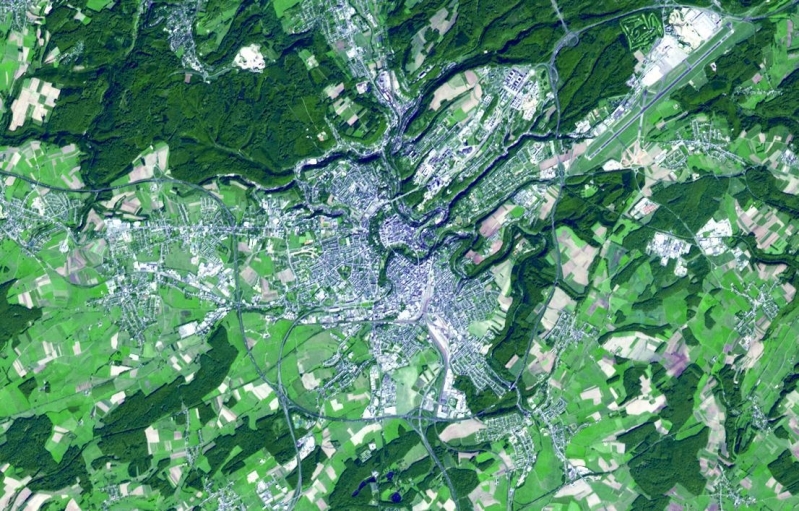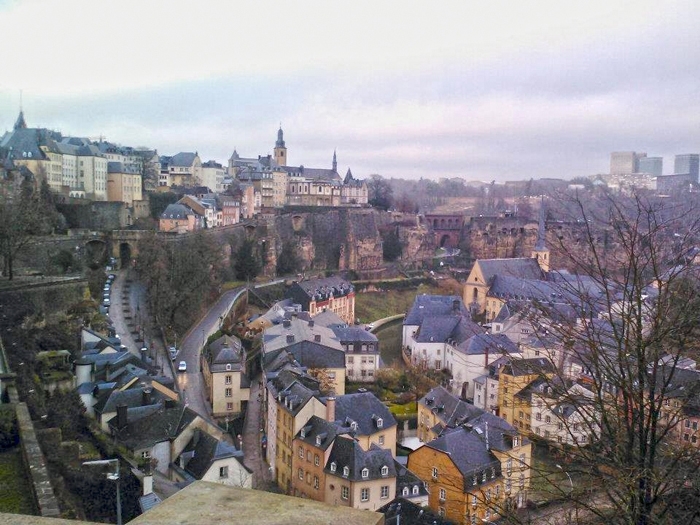Luxembourg
Luxembourg is a lanlocked nation of a half million people in western Europe, between Belgium, France and Germany.
Its major environmental issues include air and water pollution in urban areas and soil pollution of farmland.
Founded in 963, Luxembourg became a grand duchy in 1815 and an independent state under the Netherlands. It is the only Grand Duchy in the world.
It lost more than half of its territory to Belgium in 1839 but gained a larger measure of autonomy.
Full independence was attained in 1867.
Overrun by Germany in both world wars, it ended its neutrality in 1948 when it entered into the Benelux Customs Union and when it joined NATO the following year.
Luxembourg has long been a prominent supporter of European political and economic integration. In efforts foreshadowing European integration, Luxembourg and Belgium in 1921 formed the Belgium-Luxembourg Economic Union (BLEU) to create an inter-exchangeable currency and a common customs regime. Luxembourg is a member of the Benelux Economic Union and, In 1957, became one of the six founding countries of the European Economic Community (later the European Union), and in 1999 it joined the euro currency area.
It also participates in the Schengen Group, which allows for the free movement of citizens among member states. At the same time, Luxembourgers have consistently recognized the value of a dynamic, transatlantic relationship, and the Grand Duchy traditionally has pursued a pro-NATO, pro-U.S. foreign policy.
Luxembourg is the site of the European Court of Justice, European Court of Auditors, and European Investment Bank, as well as other vital EU organs. The Secretariat of the European Parliament is located in Luxembourg. The EU stability fund created in response to effects of the international financial crisis is based in Luxembourg.
Contents
Geography
Location: Western Europe, between France and Germany
Geographic Coordinates: 49 45 N, 6 10 E
Area: 2,586 sq km
Land Boundaries: 359 km (Belgium 148 km, France 73 km, Germany 138 km)
Terrain: mostly gently rolling uplands with broad, shallow valleys; uplands to slightly mountainous in the north; steep slope down to Moselle flood plain in the southeast. The highest point is Buurgplaatz (559 m) and the lowest point Moselle River (133 m)
Climate: modified continental with mild winters, cool summers.
Topology of Luxembourg. Source: Wikimedia Commons.
Ecology and Biodiversity
Ecologically, Luxembourg is part of the Western European broadleaf forests ecoregion.
| An old section of the Citadel wall. |
People and Society
Population: 503,302 (July 2011 est.)
Ethnic Groups: Luxembourger 63.1%, Portuguese 13.3%, French 4.5%, Italian 4.3%, German 2.3%, other EU 7.3%, other 5.2% (2000 census)
Age Structure:
0-14 years: 18.2% (male 47,274/female 44,366)
15-64 years: 66.9% (male 169,343/female 167,211)
65 years and over: 14.9% (male 31,086/female 44,022) (2011 est.)
Population Growth Rate: 1.145% (2011 est.)
Birthrate: 11.69 births/1,000 population (2011 est.)
Death Rate: 8.48 deaths/1,000 population (July 2011 est.)
Net Migration Rate: 8.24 migrant(s)/1,000 population (2011 est.)
Life Expectancy at Birth: 79.61 years
Total Fertility Rate: 1.77 children born/woman (2011 est.)
Languages: Luxembourgish (national language), German (administrative language), French (administrative language)
Literacy (age 15 and over can read and write): 100% (2000 est.)
Urbanization: 85% of total population (2010) growing at an annual rate of change of 1.4% (2010-15 est.)
History
After 400 years of domination by various European nations, Luxembourg was granted the status of Grand Duchy by the Congress of Vienna on June 9, 1815. Although Luxembourg considers 1835 (Treaty of London) to be its year of independence, it was not granted political autonomy until 1839 under King William I of the Netherlands, who also was the Grand Duke of Luxembourg. In 1867, Luxembourg was recognized as independent and guaranteed perpetual neutrality. After being occupied by Germany in both World Wars, Luxembourg abandoned neutrality and became a charter member of the North Atlantic Treaty Organization (NATO) in 1949. It is also one of the six original members of the European Union (EU), formed in 1951 as the European Coal and Steel Community (ECSC).
The present sovereign, Grand Duke Henri, succeeded his father, Grand Duke Jean, on October 7, 2000. Grand Duke Jean announced his decision to abdicate in December 1999, after a 35-year reign.
The national language of Luxembourg is Luxembourgish, a blend of Dutch, old German, and Frankish elements. The official language of the civil service, law, and parliament is French, although parliamentary debate and court cases are conducted mainly in Luxembourgish and police case files are recorded in German. German is the primary language of the press. French and German are taught in the schools, with German spoken mainly at the primary level and French at the secondary level. In addition, English is taught in high schools. Most Luxembourgers, as a result, speak at least some English.
Because of its strategic position, the City of Luxembourg was, from the 16th century until 1867, when its walls were dismantled, one of Europe's greatest fortified sites. It was repeatedly fortified as it passed from one great European power to another: the Holy Roman Emperors, the House of Burgundy, the Habsburgs, the French and Spanish kings, and finally the Prussians. Today, with a population of about 90,000, the city is the capital of the Grand Duchy of Luxembourg. The image was acquired September 21, 2006, covers an area of 10.6 x 16.5 km, and is located at 49.6 degrees north latitude, 6.1 degrees east longitude. Source: NASA's Jet Propulsion Laboratory
Government
Government Type: constitutional monarchy
Luxembourg has a parliamentary form of government with a constitutional monarchy. Under the constitution of 1868, as amended, executive power is exercised by the Grand Duke and the Council of Government (cabinet), which includes the prime minister, who serves as head of government. The prime minister is the leader of the political party or coalition of parties having the most seats in parliament, known as the Chamber of Deputies.
Legislative power is vested in the Chamber of Deputies, the members of which are elected directly to 5-year terms. A second body, the "Conseil d'Etat" (Council of State), composed of 21 citizens appointed by the Grand Duke, advises the Chamber of Deputies in the drafting of legislation. The Council's opinions have no binding effect, and the responsibilities of its members are in addition to their normal professional duties.
Capital: Luxembourg - 90,000 (2009) 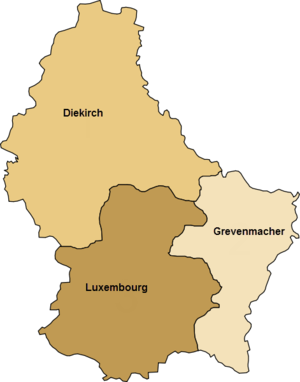 Districts of Luxembourg. Source: Wikimedia Commons
Districts of Luxembourg. Source: Wikimedia Commons
Administrative divisions: 3 districts; Diekirch, Grevenmacher, Luxembourg
Independence: 1839 (from the Netherlands)
Legal System: civil law system. Luxembourg accepts compulsory International Court of Justice (ICJ) jurisdiction; and accepts International criminal court (ICCt) jurisdiction
Luxembourg law is a composite of local practice, legal tradition, and French, Belgian, and German systems, as well as European Union law. The apex of the judicial system is the Superior Court, whose judges are appointed by the Grand Duke.
Political Conditions:
Luxembourg's political system has a strong local focus. National politicians very often begin their careers and establish a political base serving as mayors, and members of the Chamber of Deputies are elected from one of four regions. The political culture favors consensus, and the parties coexist within the context of broad agreement on key issues, including the value of deep European integration. National elections are held at least every 5 years and municipal elections every 6 years. Elections for the Chamber of Deputies were held in June 2009.
Since the end of World War II the Christian Social People’s Party (CSV) has been part of the governing coalition and usually the dominant party. The only exception was from 1974-1979 when the CSV was in opposition to a governing coalition led by the center-right Democratic Party (DP). The CSV resembles Christian democratic parties in other west European countries and enjoys broad popular support. Its leader, Prime Minister Jean-Claude Juncker, in power since 1995, is the longest-serving head of government in the European Union.
The Socialist Party (LSAP) is a center-left party similar to most social democratic parties in Europe. Initially founded by a workers’ movement and a main defender of universal suffrage in 1919, the LSAP defends state intervention in the economy and the sustainability of the welfare system. Part of the government from 1984 to 1999, it lost its junior coalition status to the Democratic Party only to regain it in the 2004 elections.
The center-right Democratic Party (DP) draws much of its support from civil servants, the professions, and urban middle class. Like other West European liberal (i.e., libertarian) parties, it advocates both social legislation and minimum government involvement in the economy. It also is strongly pro-NATO. In the opposition from 1984 to 1999, the DP overcame the LSAP to claim the role of junior partner in the government from 1999-2004. It is currently again in the opposition.
Other notable parties include the Green Party, which has received growing support since it was officially formed in 1983. It opposes both nuclear weapons and nuclear power and supports environmental and ecological preservation measures. The Greens generally oppose Luxembourg's military policies, but the party has shown some openness to peacekeeping missions. The ADR (Alternative Democratic Reform Party) when elected in 2004 was known as the Action Committee for Democracy and Pension Rights. The Left (former communist) party has one seat in the 60-member Chamber of Deputies.
View of Luxembourg city and valley from constitutional court. Source: Wikimedia Commons.
International Environmental Agreements
Luxembourg is party to international agrements on: Air Pollution, Air Pollution-Nitrogen Oxides, Air Pollution-Persistent Organic Pollutants, Air Pollution-Sulfur 85, Air Pollution-Sulfur 94, Air Pollution-Volatile Organic Compounds, Biodiversity, Climate Change, Climate Change-Kyoto Protocol, Desertification, Endangered Species, Hazardous Wastes, Law of the Sea, Marine Dumping, Ozone Layer Protection, Ship Pollution, Tropical Timber 83, Tropical Timber 94, and Wetlands. It has signed, but not ratified an international agrement on Environmental Modification.
Water
Total Renewable Water Resources: 1.6 cu km (2005)
Freshwater Withdrawal: 0.06 cu km/yr (42%/45%/13%) (42% domestic, 45% industrial, 13% agricultural)
Per Capita Freshwater Withdrawal: 121 cu m/yr (1999)
Resources
Natural Resources: iron ore (no longer exploited), arable land.
Land Use:
Economy
This small, stable, high-income economy - benefiting from its proximity to France, Belgium, and Germany - has historically featured solid growth, low inflation, and low unemployment.
While Luxembourg is aptly described as the "Green Heart of Europe" in tourist literature, its pastoral land coexists with a highly sophisticated, industrialized, export-intensive, and high-tech-driven services economy. Luxembourg’s economic success has made it one of the wealthiest countries in the world, with a per capita income that routinely ranks in the world’s top three.
In 1876, English metallurgist Sidney Thomas invented a refining process that led to the development of the steel industry in Luxembourg and the founding of the Arbed company in 1911. In 2001, Arbed merged with Aceralia and Usinor to form Arcelor, which was headquartered in Luxembourg. In 2005, Arcelor acquired Canada's largest steel manufacturer, Dofasco. In 2006, Arcelor merged with Mittal Steel to become ArcelorMittal, the largest steelmaker in the world. The company now produces 8% of the world's steel output. The iron and steel industry in Luxembourg comprises approximately 7% of the overall economy.
During the past few decades there has been a relative decline in the steel sector, offset by Luxembourg's emergence as a major financial services and technology center. As of September 2010 there were 149 banks in Luxembourg; banks employed 26,416 people as of 2009. Political stability, good communications, easy access to other European financial centers, and skilled multilingual staff have contributed to the growth of the financial sector. Growth in the financial sector, which now accounts for about 28% of GDP, has more than compensated for the decline in steel. Most banks are foreign owned and have extensive foreign dealings, but Luxembourg has lost some of its advantages as a tax haven because of OECD and EU pressure. German banks represent the largest number, with Belgian, French, Italian, Japanese, Swedish, Swiss, U.K., and U.S. banks also having a significant presence in the country.
Government policies promote the development of Luxembourg as a leader in Europe’s telecommunications sector. Radio-Television-Luxembourg (commonly known as RTL) is Europe's premier private radio and television broadcaster. The government-backed Luxembourg satellite company Societe Europeenne des Satellites (SES) was created in 1986 to install and operate a satellite telecommunications system for transmission of television programs throughout Europe. The first SES "ASTRA" satellite, a 16-channel RCA 4000, was launched by Ariane rocket in December 1988. SES presently operates over 40 satellites.
Over the past decade, Luxembourg has sought to diversify its services economy beyond the financial sector by promoting the high-tech/information technology and e-commerce sector. The government has made significant investments in infrastructure to increase broadband capacity and has become one of the leading countries in the number of high-speed Internet connections per capita. Multiple data centers were built to facilitate international network connectivity, and prices for commercial Internet usage have fallen. The Grand Duchy is seeking to position itself as a technology and e-commerce hub in Europe, with ultra-high bandwidth Internet infrastructure (fiber optic cable networks to all households) by 2013.
Luxembourg was the only EU country without a full university until 2003, when the University of Luxembourg was established as a national public university. The majority of college-age Luxembourgers still study outside of the Grand Duchy, usually in neighboring EU countries or the United Kingdom. However, the University of Luxembourg continues to expand and is attracting thousands of foreign students, mainly to its finance and law programs but also to science programs which are enhanced by a collaboration with the Integrated BioBank of Luxembourg launched in 2008 and specializing in biomedical research focusing on cancer detection.
Luxembourg offers a favorable climate to foreign investment. Successive governments have effectively attracted new investment in medium, light, and high-tech industry. Incentives cover taxes, construction, and plant equipment. U.S. firms are among the most prominent foreign investors, producing tires (Goodyear), chemicals (DuPont), glass (Guardian Industries), and a wide range of industrial equipment. The Department of Commerce's Bureau of Economic Analysis reports that total U.S. direct investment in Luxembourg (on a historical cost basis) was nearly $153 billion at the end of 2008. Foreign direct investment (FDI) data for Luxembourg must be interpreted cautiously, however, because of Luxembourg's role in financial intermediation, particularly involving Luxembourg-based holding companies.
Labor relations have been peaceful since the 1930s. Most industrial workers are organized by unions linked to one of the major political parties. Representatives of business, unions, and government participate in the conduct of major labor negotiations, although this “tripartite” arrangement broke down in 2010 under the strain of negotiations during the economic crisis and union opposition to welfare cuts and the proposal to no longer index wage increases to inflation.
Luxembourg’s unemployment rate was estimated at 7.8% in 2011. Luxembourg's small but productive agricultural sector employs 1% of the total labor force, a typical figure for a highly developed country. Most farms produce milk, meat, and foraging crops. Timber is another important sector. Luxembourg, being a part of the Moselle region, produces outstanding white wines and also Pinot Noir, a light red wine, competitive in quality with French wines.
Due to its powerful financial services sector, Luxembourg maintains a favorable current account balance, with a €2.59 billion surplus in 2010 ($3.4 billion). Government finances deteriorated somewhat in 2009, with a budget deficit of €277.7 million ($394.3 million) versus a surplus of €1.13 billion in 2008 ($1.61 billion).
The economy depends on foreign and cross-border workers for about 60% of its labor force.
Luxembourg, like all EU members, suffered from the global economic crisis that began in late 2008, but unemployment has trended below the EU average. Following strong expansion from 2004 to 2007, Luxembourg's economy contracted and 3.7% in 2009, but rebounded 3.2% in 2010.
The country continues to enjoy an extraordinarily high standard of living - GDP per capita ranks third in the world, after Liechtenstein and Qatar, and is the highest in the EU.
Turmoil in the world financial markets and lower global demand during 2008-09 prompted the government to inject capital into the banking sector and implement stimulus measures to boost the economy. Government stimulus measures and support for the banking sector, however, led to a 5% government budget deficit in 2009. Nevertheless, the deficit was cut to 1.4% in 2010.
GDP: (Purchasing Power Parity): $41.09 billion (2010 est.)
GDP: (Official Exchange Rate): $54.95 billion (2010 est.)
GDP- per capita (PPP): $82,600 (2010 est.)
GDP- composition by sector:
Agricultural products: grapes, barley, oats, potatoes, wheat, fruits; dairy and livestock products
Industries: banking and financial services, iron and steel, information technology, telecommunications, cargo transportation, food processing, chemicals, metal products, engineering, tires, glass, aluminum, tourism
Currency: Euros (EUR)
